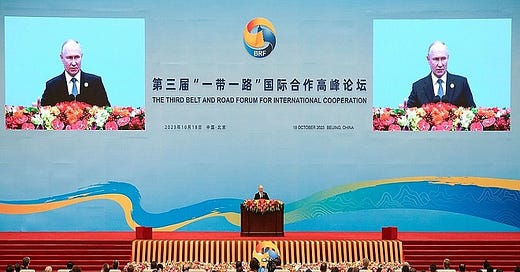By encouraging more foreign investment in the North-South Transport Corridor that India is involved in, including from China as regards those projects that run through Russia, President Putin was suggesting that those two’s Eurasian connectivity initiatives shouldn’t be seen as competitors.
President Putin used the global attention afforded to this year’s BRI Forum to raise maximum awareness of Russia’s investment potential in the Arctic, but his desire to court foreign investment there isn’t anything new in and of itself since he’s talked about this for a while. As the ice melts, more European-Asian trade is expected to be conducted along this route, and Russia would like to internationalize investment there so that it isn’t disproportionately Chinese.
NATO has already signaled plans to strengthen its military presence in the Arctic on the false pretext of containing alleged threats from Russia there, but this will be more difficult for those countries to justify if trade along the Northern Sea Route continues growing and investment into it is internationalized. If the Kremlin’s plans succeed, then any potential NATO obstruction of that corridor would be economically disadvantageous for Europe and could also be met with protests from the West’s Asian trade partners.
Considering this, it appears as though President Putin is trying to preemptively avert the region’s NATO-led militarization by doubling down on his country’s geo-economic plans there. This would advance both its security and trade interests in one fell swoop, which explains why he promoted the Northern Sea Route at the forum. This project also diverts attention away from negative Western narratives about Russia and towards more positive ones like its Eurasian connectivity potential.
The West will undoubtedly continue trying to frame BRI as supposed proof of the impending bifurcation of the previously globalized economic system, but this narrative is challenged by some of the specifics from President Putin’s speech. He importantly drew attention to his country’s Eurasian connectivity potential through the Northern Sea Route and North-South Transport Corridor projects, which dispels the notion that China and the West are the only major infrastructure players in the world nowadays.
The second-mentioned initiative also involves India, which opposes BRI on the basis that its flagship China-Pakistan Economic Corridor transits through Pakistani-controlled disputed territory that Delhi claims as its own. Prime Minister Modi didn’t attend last week’s forum for that same reason, and Sino-Indo ties have markedly deteriorated over the past year too. India was therefore the proverbial “elephant in the room”, but not necessarily in a bad way from Russia’s perspective.
By encouraging more foreign investment in the North-South Transport Corridor that India is involved in, including from China as regards those projects that run through Russia, President Putin was suggesting that those two’s Eurasian connectivity initiatives shouldn’t be seen as competitors. In theory, China could partially fund some Russian-based initiatives that India and others end up using to scale bilateral trade. The signal being sent is that infrastructure development should be prioritized over geopolitical rivalry.





"...obstruction of that corridor would be economically disadvantageous for Europe..."
Yeah, and how did that influence their decision to 'disadvantage' the NordStream Pipeline?
"The signal being sent is that infrastructure development should be prioritized over geopolitical rivalry."
How about this for a signal: BOOM!!!